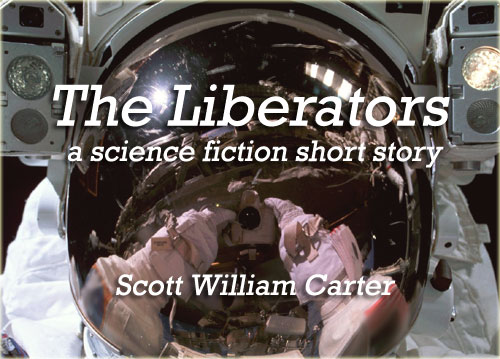One of my big efforts this year is getting all of my short stories online, available for purchase. With the increasing popularity of the Kindle, and with Apple’s big foray into the world of electronic reading with the iPad, I don’t think it’s a market that any writer can afford to ignore. So here’s what I’m going to do. The second Sunday of every month, I’m going to publish a reprint of one of my stories, which I’ll make available in both Kindle format and as a PDF over on Scribd for those of you who want to read them on your computer. Every now and then I’ll even throw in a story for free. Most will be available for between $.99 and $1.99 depending on the length.
I’ll put the first few pages here on the blog. If you’d like to read more, just click the links at the bottom.
First up, “The Liberators,” which originally appeared in Analog Science Fiction and Fact in April 2004. I’ve actually had this story up on Amazon for a while and it’s been my top selling story.

The Liberators
Scott William Carter
I heard the report of a cannon a half second before the boulder on the ridge above us exploded.
Pebbles pinged off my helmet. The ventilator fans whirred behind my ears, and a bead of sweat trickled down my cheek. The suits did a good job of filtering the air, but the inside of my helmet still smelled slightly metallic.
It was the dead of night, but my Visosuit enhanced the image, giving the rocky gully an amber tint. The Dulnari had lousy night vision, so we always fought after sunset. I quickly counted ten black, sleek-domed helmets in the gully. Each helmet was marked with a different number, and Rina’s number 22 was on the far end. We broke up two weeks earlier, but I still liked having her close during combat.
“Major Steed,” my brother’s voice crackled over the all-suit frequency, “report.”
Damon sounded calm as a man could be. I watched Rina for a reaction, but she didn’t move. I knew she had been spending her time lately with that egghead, Lieutenant Dyle, but I still wondered if she and Damon would hook up now that I was out of the picture.
“Got a group of two hundred Dulnari pinned in a mountain bunker, Colonel,” I said to him. “The rest of the target planet has been contained.”
I stopped thinking of the planets as having names long ago. After a while, they all blurred together.
“Good . . . We need to finish this planet up and move on to the next one. Get it done quickly.”
“Yes, sir.”
He cut the transmission.
I suddenly felt tired. There was always another target. Such was the way of life in the elite LS-37, a Liberation Squad who had liberated more planets from the tyrannical rule of the Dulnari than anyone else. We were legendary in the Unity Defense, our slogan whispered among lesser soldiers like a hallowed prayer. LS-37, Angels Protected by the Glory of Heaven.
I peered over the edge of the gully. The mountain sloped up gently until it reached the rectangular peak. An opening big enough for their cannons circled the peak; there were two or three cannons on each side. We could fly up there in under three seconds.
The problem was that we’d be easy targets. What we needed was a distraction.
Our suits were controlled by the electrical impulses in our brains. I thought the all-suit frequency on, and it was. “Lieutenant Dyle,” I said, “take Delta Group and do a flyby over the mountain, dropping flash grenades. The rest of us will storm the bunker. Hold for my command.”
There was a brief pause, and then his reply came back.
“Yes, sir,” he said.
“All other teams, await my command,” I said.
Before I even finished the sentence, Rina was scooting in my direction. She was a small woman, but inside the bulky black Visosuit you would never know it.
Our suits were mini spacecraft in their own right. The slim packs on our backs were loaded with various bombs and missiles, and the fingers of our gloves were equipped with lasers. The metaplak material could withstand a direct hit from almost any handheld weapon.
Since the Defense had equipped us with the suits, our battles lately had been decisively won. We moved in fast, destroyed the Dulnari’s local military, and left just as quickly. A recovery team followed within a day, helping the planet rebuild.
When Rina was close, I could see through the tinted faceplate to her face — or not really her face, but a re-creation of her face on the external screen. She was Asian-Latino by heritage. She had narrow, slanted eyes, and her skin was the color of coffee with cream. The dust in the air made it hard to read her expression.
“Sir,” she said, and I could tell she was fighting to keep her voice calm. “Sir, could I suggest that we all attack as one? There’s no need to put Delta Group in danger.”
I wondered how close she and Dyle had truly become. “We need a distraction, Private,” I replied.
“But, sir, if we all attack–”
“End of discussion,” I said curtly.
She glared at me through the dust, then scooted back to the end of the line. The rest of the faceplates were turned toward me. I knew my history with Rina was no secret.
I switched to the all-suit frequency. “Delta Group, attack now!”
My own suit had something my soldiers’ suits didn’t — a small monitor, mounted inside my helmet just below my faceplate, that allowed me to see what any of my soldiers saw. I thought the command Screen 40 and up came Lieutenant Dyle’s view.
Dyle was directly over the mountain. The enemy’s cannons fired, one after another in rapid succession, and the ground beneath us trembled.
I turned on the all-suit frequency. “All other groups, attack now!”
We took to the air just as white flashes began to spot the mountain. There were five teams, each with ten drop soldiers, so the sky was filled with fifty of us. I felt the antigrav thrusters trembling beneath my feet.
We descended on their bunker like a swarm of black hornets. All around us were flashes of white light. I followed my men through the opening, blasting the Dulnari standing there with my finger lasers.
We stepped over the bodies we just brought down. They were humanoid, much like us: similar height, two arms and two legs, breathing air and expelling carbon dioxide. One of the most amazing discoveries since contact was made with other species was that these facts held for most of us.
But the Dulnari had a more pronounced, wolf-like nose, and their sense of smell was keener. Their leathery skin was dark gray except for the skin around their yellow eyes, which was a luminescent blue. Their heads were smaller, and individually, they were not as smart. But they had more specialization in intelligence; when they acted in concert, their total intelligence exceeded ours.
The big difference, though, was that the Dulnari were ruthlessly ambitious in a way we never were. Every sentient species we encountered had the option of joining the Unity Worlds. The Dulnari took them all by force.
Until we decided to stop them.
A dimly-lit tunnel circled the bunker. We took out each cannon-room one at a time. It all seemed to be going well until Lieutenant Dyle shouted out over the radio.
“Hit! . . . Going down!”
Rina stared at me. Grimacing, I changed to Dyle’s screen, and saw the image of the ground rushing up at him. My screen went to static, then the image returned. Now he was looking at the sky.
“Must do this . . . ” he groaned.
Then the worst possible thing happened.
He removed his helmet.
I knew this because I was suddenly seeing his face, bloodied and bruised, on my screen. His blond hair was matted against his scalp. The helmet must have been down on the ground next to him.
“Lieutenant Dyle!” I cried.
It was no use. Without his helmet, communication was impossible. As every drop soldier knew, the one thing that you could not do–that you were strictly forbidden to do–was to remove your helmet. Even if a planet had a breathable atmosphere, the helmet gave a soldier full access to the Visosuit’s abilities, allowed him to remain in contact with other soldiers, and permitted his superiors to use his visuals for tactical decisions.
I was deciding what to do when my brother bellowed over the frequency.
“Just what the hell is going on down there, Major?”
“Sir,” I replied, “Lieutenant Dyle’s helmet–”
“I can see what happened. What I want to know is why.”
“I don’t know. Perhaps –”
“The Med will be there in less than two minutes,” he said. “Let it get him out of there. Subdue the bunker.”
“Sir, don’t you think we should provide cover for the Med?”
“No time. The Dulnari are fleeing the bunker as we speak. Concentrate your troops on stopping them.”
He clicked off. The rest of the troops had moved ahead, and it was just me and Rina lagging behind.
“Let’s go,” I said, stepping past her.
She didn’t move.
“Rina? You heard the orders.”
“Kaden needs us,” she said.
“The Med–”
“I’m going.”
She ran back into the last cannon-room. I followed, yelling her name, but she didn’t stop. She took to the air, rocketing through the opening.
——– continued ——–
Read the rest of the story:
[$1.99 Kindle]
[$1.99 Scribd]



